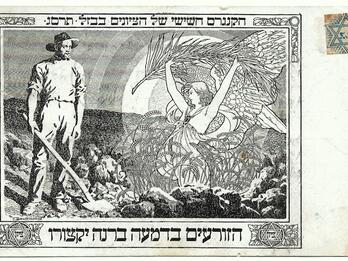Jewish Women and Zionism
When history recounts the life and fortune of the peoples who lived in various epochs, when it lets us believe in the marvelous strides that they had made, whether in the field of war, or for civilization, we see that exactly when the nation had reached its highest point of glory, it starts to lose its strength. After all that glory comes destruction, after all that life and vitality comes ruin and absolute death.
Then we ask ourselves, where was all this lost, where did it all go wrong? How is it possible that a people disappears and dies after all that glory? Didn’t it have a holy ideal to pursue for the future? And didn’t it place this ideal above everything else?
Here is exactly the secret of the disappearance of so many nations that had a glorious past, and here at the same time is the secret of the continued existence of our people. The nations that no longer exist disappeared completely from the earth because they did not have an ideal to pursue.
But it is not the same thing when it comes to our small nation; in the midst of Exile, even in the middle of slavery, the small Jewish populace continued, as before, to constitute a nation. When the Jewish people lost its national liberty, it disappeared as a political group, but it didn’t die as a nation. On the contrary, in slavery it gained new strength. The hope of a better future, the belief in the return of liberty, that is what gave power to the Jew for living in health and strength among the peoples who believed him to have been completely destroyed. And today, after so much suffering, he hasn’t died; on the contrary, he continues to live, and always with the hope that sustained him until today, the hope of one day attaining liberty.
But who maintained this hope in the heart of the slave Jew? Who doesn’t know that it is the Law (Torah), yes, the Law with which the Jew enlightened the whole world? And this Law, which the Jew knew to embrace and love more than anything else, who kept on nourishing it in his heart? History is there to demonstrate the fact that it was the Jewish woman.
And so, what the Jewish woman has done for so many during hundreds of years, why shouldn’t she continue to do it still? The Jewish people want to return to a life of liberty. It would be unjust if the role of the woman in this task, so important and so powerful, were to be counted as of little importance. Today if our new generation needed to be awakened, encouraged, and inspired [lit., inflamed] with the wish to return to our ancient land, wouldn’t it be necessary for the Jewish woman to remember the important role she played during the long history of the long galut [diaspora] of the people, and that today she should do the same thing for her children and for her people?
Klara [from] Philippopolis
Translated by
.
Credits
Klara, “La mujer judía y el zionismo” [Jewish Women and Zionism], Ha-shofar, Jan. 8, 1903, p. 103.
Published in: The Posen Library of Jewish Culture and Civilization, vol. 7.



